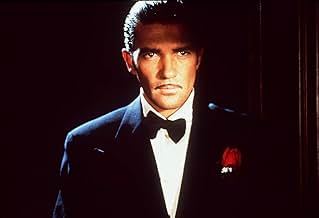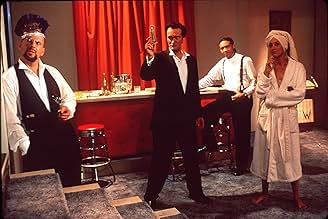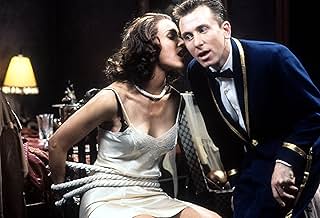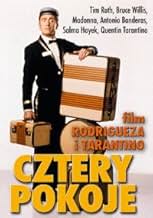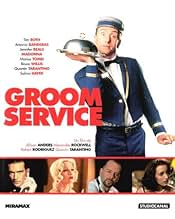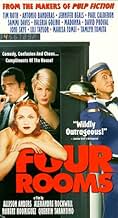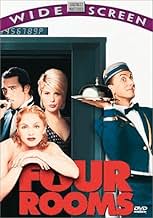Cuatro cuentos entrelazados que tienen lugar en un hotel durante la Nochevieja.Cuatro cuentos entrelazados que tienen lugar en un hotel durante la Nochevieja.Cuatro cuentos entrelazados que tienen lugar en un hotel durante la Nochevieja.
- Premios
- 1 premio ganado y 1 nominación en total
Amanda De Cadenet
- Diana (segment "The Missing Ingredient")
- (as Amanda deCadenet)
Patricia Vonne
- Corpse (segment "The Misbehavers")
- (as Patricia Vonne Rodriguez)
Opiniones destacadas
Four Rooms, the 4 part directed, 4 part written mix-matched movie turns out to be an awesome combination. With Robert Rodriguez and Quentin Tarantino working on this film, you seem to expect a trigger-happy film festival with plenty of bombs and explosives to spare. But what the final product turns out to be is a laugh-out-loud comedy which follows a bellhop's mishaps one night as he scrambles to keep his hotel in order. Tim Roth is always a great performer and in this movie there is no difference. Kudos indeed.
It's impossible to analyze this film without breaking it down into its four segments for separate comment. It would also be improper, since it was not intended to be anything less than an anthology from four notable independent filmmakers: Alexandre Rockwell, Alison Anders, Robert Rodriguez, and Quentin Tarantino.
The first episode is exactly the sort of thing that someone in a high school drama production would want to do, but can't get away with in a high school drama production. It's juvenile, unfunny, and lifeless, but it has the (pointless) nudity and lines of dialogue like:
Witch #1: "I am your mother."
Witch #2: "Then why are we sleeping together?"
that sound like the screenwriter is giggling and thinking, "I can't believe I'm getting away with this! I'm so clever!"
Nothing is at stake in the first episode; it's generally expected that a story must have conflict in order to BE a story. This has none. Just some half-baked jokes and a pair of topless women (If I wanted that, I'd skip renting a movie and go out instead.)
Second episode is a hair better, but you'll find yourself crying "Why doesn't Ted the Bellboy do [insert plot resolution here] and get the bloody hell out of there!" When it finally does end, you're disheartened to find that it had no reason to exist. Two snips with a pair of scissors, a bit of tape, and we wouldn't know the difference. Roll opening credits, go straight to the Rodriguez segment.
Third episode has some structural support to keep it from caving in on itself. The surprise in the middle (I won't give it away, don't worry) is horrifying enough to give the segment some heft. Rodriguez and his d.p., Guillermo Navarro, move it along dexterously and (as usual) have a good handle on visual comedy.
The last segment is the best. I think it's safe to say that Quentin Tarantino has, officially, never disappointed me as a director or screenwriter. My heart leapt as soon as I heard his trademark dialogue coming from the lips of Marisa Tomei as "Four Rooms" segued from "The Misbehavers" to "The Man From Hollywood." I wasn't sure if his take on Ted the Bellhop's misadventures was going to be any good, but I knew that if he wrote it and helmed it, it wasn't going to be all bad.
What a pleasant surprise (still just talking about the fourth segment here). This part of the movie, with its ridiculous premise (lifted form an old Hitchcock episode, which it acknowledges out loud), moves along speedily, and the actors take to it as naturally as any other movies by Q.T. Basically playing himself, Tarantino is hilarious. If anything, he knows A) how people really act when they're drunk (i.e. not like Dudley Moore caricatures) B) why people think he's so obnoxious, like a real-life, fast-talking Jar Jar Binks and C) how to put some bang in his visual storytelling. It's low-rent Tarantino, don't get me wrong, but it's also the best part of "Four Rooms."
All in all, the first film I've ever seen that starts out with a loathsome, horrifying badness, gets incrementally better with each passing fifteen minutes, and ends as good as one would like. Just don't make me watch it again.
The first episode is exactly the sort of thing that someone in a high school drama production would want to do, but can't get away with in a high school drama production. It's juvenile, unfunny, and lifeless, but it has the (pointless) nudity and lines of dialogue like:
Witch #1: "I am your mother."
Witch #2: "Then why are we sleeping together?"
that sound like the screenwriter is giggling and thinking, "I can't believe I'm getting away with this! I'm so clever!"
Nothing is at stake in the first episode; it's generally expected that a story must have conflict in order to BE a story. This has none. Just some half-baked jokes and a pair of topless women (If I wanted that, I'd skip renting a movie and go out instead.)
Second episode is a hair better, but you'll find yourself crying "Why doesn't Ted the Bellboy do [insert plot resolution here] and get the bloody hell out of there!" When it finally does end, you're disheartened to find that it had no reason to exist. Two snips with a pair of scissors, a bit of tape, and we wouldn't know the difference. Roll opening credits, go straight to the Rodriguez segment.
Third episode has some structural support to keep it from caving in on itself. The surprise in the middle (I won't give it away, don't worry) is horrifying enough to give the segment some heft. Rodriguez and his d.p., Guillermo Navarro, move it along dexterously and (as usual) have a good handle on visual comedy.
The last segment is the best. I think it's safe to say that Quentin Tarantino has, officially, never disappointed me as a director or screenwriter. My heart leapt as soon as I heard his trademark dialogue coming from the lips of Marisa Tomei as "Four Rooms" segued from "The Misbehavers" to "The Man From Hollywood." I wasn't sure if his take on Ted the Bellhop's misadventures was going to be any good, but I knew that if he wrote it and helmed it, it wasn't going to be all bad.
What a pleasant surprise (still just talking about the fourth segment here). This part of the movie, with its ridiculous premise (lifted form an old Hitchcock episode, which it acknowledges out loud), moves along speedily, and the actors take to it as naturally as any other movies by Q.T. Basically playing himself, Tarantino is hilarious. If anything, he knows A) how people really act when they're drunk (i.e. not like Dudley Moore caricatures) B) why people think he's so obnoxious, like a real-life, fast-talking Jar Jar Binks and C) how to put some bang in his visual storytelling. It's low-rent Tarantino, don't get me wrong, but it's also the best part of "Four Rooms."
All in all, the first film I've ever seen that starts out with a loathsome, horrifying badness, gets incrementally better with each passing fifteen minutes, and ends as good as one would like. Just don't make me watch it again.
First Story- * 1/2 out of ****
Second Story- ** out of ****
Third Story- ***1/2 out of ****
Forth Story- **** out of ****
This film is strange, but it gets better as it goes along. It is difficult to get into, but once the viewer gets into it, it is a funny, disturbing, and unique film. The plot is basically of a bellboy(played by the always good, Tim Roth) who has to take care of a hotel for the night on New Years Eve. He gets involved in some strange and off-color characters and slowly is driven insane by it all. There are four stories total. he first one is about a coven of witches who must find semen for their magic potion to resurrect a model. The second is about a suspicious husband who ties his wife up and holds a gun to the bellboy's face because he thinks she is cheating on him with the bellboy, only the bellboy soon discovers that this is just a weird trick. The third story(and by for the goriest) is about a rich man and his wife leaving his children alone at the hotel with the bellboy to babysit. And the forth is about a macabre bet involving a bunch of Hollywood yuppies, a car, a lighter, and removal of body parts.
The first story is really only for certain audiences. I didn't dig it, but I could see why certain people may. The jokes about sex and possible incest were tiresome, the witches were stereotypes and were poor ones, and the camera angles were terrible never allowing the audience to really get into the story. The reason why is because it is shown at a fly-on-the-wall distance and for a plot involving witches it helps to know what they are up to in a closer way. Normally this cinematic approach would work well, most noticeably the brilliant Peter Greenway film, THE COOK, THE THIEF, HIS WIFE, AND HER LOVER, which the movie strongly reminded me of for some reason and Tim Roth was also in it.
The second story was very perverse but didn't offer any way to involve the viewer in actually finding it interesting which it should have been. There is a sequence in which Tim Roth is put to inane stunt-work where he must get himself back into the apartment, even though he is falling out of it through the window. The stunt seems misguided and out of place in the drama of this story. The ideas are good, but the execution didn't quite work. Some pretty strange intensity by Jennifer Beals here.
The film takes a large jump forward into sharp comedy and independent ideas. The tone was mean-spirited and wicked. The children were appropriately mischievous and the father(Antonio Banderes) was nuts. The camera work was involving, and the comedic notes were hit correctly. The story worked and the viewer will have it stuck in their minds for days if they can't make it to the next story.
The best of the four is the last one, with quick and sensible dialog, an inspired plot, appropriate acting, and an off-kilter ending that is shocking, brutal, and brilliant.
Rated R for pervasive strong language, sexuality and some drug use.
Second Story- ** out of ****
Third Story- ***1/2 out of ****
Forth Story- **** out of ****
This film is strange, but it gets better as it goes along. It is difficult to get into, but once the viewer gets into it, it is a funny, disturbing, and unique film. The plot is basically of a bellboy(played by the always good, Tim Roth) who has to take care of a hotel for the night on New Years Eve. He gets involved in some strange and off-color characters and slowly is driven insane by it all. There are four stories total. he first one is about a coven of witches who must find semen for their magic potion to resurrect a model. The second is about a suspicious husband who ties his wife up and holds a gun to the bellboy's face because he thinks she is cheating on him with the bellboy, only the bellboy soon discovers that this is just a weird trick. The third story(and by for the goriest) is about a rich man and his wife leaving his children alone at the hotel with the bellboy to babysit. And the forth is about a macabre bet involving a bunch of Hollywood yuppies, a car, a lighter, and removal of body parts.
The first story is really only for certain audiences. I didn't dig it, but I could see why certain people may. The jokes about sex and possible incest were tiresome, the witches were stereotypes and were poor ones, and the camera angles were terrible never allowing the audience to really get into the story. The reason why is because it is shown at a fly-on-the-wall distance and for a plot involving witches it helps to know what they are up to in a closer way. Normally this cinematic approach would work well, most noticeably the brilliant Peter Greenway film, THE COOK, THE THIEF, HIS WIFE, AND HER LOVER, which the movie strongly reminded me of for some reason and Tim Roth was also in it.
The second story was very perverse but didn't offer any way to involve the viewer in actually finding it interesting which it should have been. There is a sequence in which Tim Roth is put to inane stunt-work where he must get himself back into the apartment, even though he is falling out of it through the window. The stunt seems misguided and out of place in the drama of this story. The ideas are good, but the execution didn't quite work. Some pretty strange intensity by Jennifer Beals here.
The film takes a large jump forward into sharp comedy and independent ideas. The tone was mean-spirited and wicked. The children were appropriately mischievous and the father(Antonio Banderes) was nuts. The camera work was involving, and the comedic notes were hit correctly. The story worked and the viewer will have it stuck in their minds for days if they can't make it to the next story.
The best of the four is the last one, with quick and sensible dialog, an inspired plot, appropriate acting, and an off-kilter ending that is shocking, brutal, and brilliant.
Rated R for pervasive strong language, sexuality and some drug use.
8ck-7
I really don't understand why this movie got such bad reviews! Overall, this is a creative and refreshing movie. It is not Pulp Fiction but it is still a good performance. Tim Roth, especially, is the best thing in the film. Out of the four I like Robert Rodguize's misbehavior the best. The missing ingredient was indeed a bit cheesy but the rest are still above average performance. If you are interested in this movie but discouraged by the movie critics, I ensure you that you won't regret seeing it.
Four Rooms was concocted like one of those many, many collaborative efforts from directors in the 60's and 70's (i.e. The Witches, Ro.Go.PaG, Boccaccio '70, etc), except this would revolve around a bell-hop on New Years Eve. It disqualifies itself as being any kind of masterpiece or classic in independent film-making, and sometimes the filmmakers (Alison Anders, Robert Rodriguez, and Alexandre Rockwell, and Quentin Tarantino, the last two also serving as executive producer) look like they're relishing too much in their (limited) clout and exuberance to concentrate. As was with many others who viewed the film, I found that the first two segments were the lesser ones, and the last two were the best ones. It all comes down, in this case, to which two were funnier. So, let's break each one down:
Allison Anders' film is a quirky, quasi-lesbian take on a coven of witches, featuring the likes of Madonna and Lily Taylor, are the first to shake up (perhaps for the better in this one) Ted the bell-hop. Ted, by the way, is played with a continuous, nervous-type of fervor that goes from being innocuous, to annoying, and then acceptable again. It's also interesting to see how his character goes through different motions when under each director (for example, in Rodriguez's film he's more of a cartoon-type of character, and in Tarantino's film he hearkens slightly to his previous collaborations with the director, quieter, on edge in a particular way). Some of the laughs are surrounded by a kind of attitude put forth by the director that seems a little off. Maybe I'm the wrong audience for it, though- the women in the audience may appreciate it, or rather amused by it, more than I. I give it a B-
Alexandre Rockwell's The Wrong Man is my least favorite of the bunch, as Ted gets stuck with a couple of crazed fetishists (David Proval and Jennifer Beals). The problem here lies with two things- the fact that the comedic timing/chemistry is a little iffy/off with the three actors, and that the writing doesn't come off like it's naturally funny. When Beals' character Angela runs off about Ted's private parts, this could be funny, but it's more 'ho-ho' than 'ha-ha' to me. Some of the tension from Roth brings some laughs, but not enough to compensate the uncomfortable atmosphere around the whole segment. I give it a C-
The third segment, The Misbehaviors, displays how clever and quick Rodriguez can be with physical comedy (slapstick) as well as in getting laughs from kids (as he did here and there in his Spy Kids movies). It is also a boost that the whole segment comes off as though it's like a live-action Looney Tunes short- it's so ridiculous that in some scenes I burst out laughing (i.e. Ted's reaction to the corpse). The set-up with the parents was also amusing in how Banderas and Tamlyn Tomita act towards the kids. Then the pay-off knocks it out of the park. Grade: A
Then we come to the closure, featuring the indie wunderkind at the time, Tarantino, as he takes on two sources of inspiration- Rohald Dahl's "Man from the South" short story, later translated through Alfred Hitchcock's television show. It's a smart, hip little piece of Hollywood satire from Tarantino, as he himself plays an overly obnoxious Hollywood filmmaker, with two guys by his side (Paul Calderon and Bruce Willis), as they take a gamble right after the stroke of midnight. It took me a couple of time to watch this to really get into it, but when I did it was even more promising. The camera-work in the scene (via 'Dogs' and 'Pulp' cinematographer Andrzej Sekula) is deliberately paced, and it's perfectly leisurely for the pace of the last segment. That much, if not all, of the dialog is funny it's because of the skill and chemistry between the four of them. Plus, a little prologue with Marisa Tomei and Kathy Griffin gives the indication of what insanity is in store. Grade- A.
So, is this film a success? For it's time, I'm not sure. With the power of four million off the success of each director's previous efforts (Tarantino with 'Dogs', Rodriguez with El Mariachi, Anders with Gas, Food, and Lodging, and Rockwell with In the Soup, all from the 92 Sundance place), they did whatever they wanted, and it's not the success it could've been. On the other hand, when one looks at the films in perspective, it could've been a lot worse, and it wasn't. At the least, it works as one of the quintessential party movies for fans of the 90's "new-wave" crop.
Allison Anders' film is a quirky, quasi-lesbian take on a coven of witches, featuring the likes of Madonna and Lily Taylor, are the first to shake up (perhaps for the better in this one) Ted the bell-hop. Ted, by the way, is played with a continuous, nervous-type of fervor that goes from being innocuous, to annoying, and then acceptable again. It's also interesting to see how his character goes through different motions when under each director (for example, in Rodriguez's film he's more of a cartoon-type of character, and in Tarantino's film he hearkens slightly to his previous collaborations with the director, quieter, on edge in a particular way). Some of the laughs are surrounded by a kind of attitude put forth by the director that seems a little off. Maybe I'm the wrong audience for it, though- the women in the audience may appreciate it, or rather amused by it, more than I. I give it a B-
Alexandre Rockwell's The Wrong Man is my least favorite of the bunch, as Ted gets stuck with a couple of crazed fetishists (David Proval and Jennifer Beals). The problem here lies with two things- the fact that the comedic timing/chemistry is a little iffy/off with the three actors, and that the writing doesn't come off like it's naturally funny. When Beals' character Angela runs off about Ted's private parts, this could be funny, but it's more 'ho-ho' than 'ha-ha' to me. Some of the tension from Roth brings some laughs, but not enough to compensate the uncomfortable atmosphere around the whole segment. I give it a C-
The third segment, The Misbehaviors, displays how clever and quick Rodriguez can be with physical comedy (slapstick) as well as in getting laughs from kids (as he did here and there in his Spy Kids movies). It is also a boost that the whole segment comes off as though it's like a live-action Looney Tunes short- it's so ridiculous that in some scenes I burst out laughing (i.e. Ted's reaction to the corpse). The set-up with the parents was also amusing in how Banderas and Tamlyn Tomita act towards the kids. Then the pay-off knocks it out of the park. Grade: A
Then we come to the closure, featuring the indie wunderkind at the time, Tarantino, as he takes on two sources of inspiration- Rohald Dahl's "Man from the South" short story, later translated through Alfred Hitchcock's television show. It's a smart, hip little piece of Hollywood satire from Tarantino, as he himself plays an overly obnoxious Hollywood filmmaker, with two guys by his side (Paul Calderon and Bruce Willis), as they take a gamble right after the stroke of midnight. It took me a couple of time to watch this to really get into it, but when I did it was even more promising. The camera-work in the scene (via 'Dogs' and 'Pulp' cinematographer Andrzej Sekula) is deliberately paced, and it's perfectly leisurely for the pace of the last segment. That much, if not all, of the dialog is funny it's because of the skill and chemistry between the four of them. Plus, a little prologue with Marisa Tomei and Kathy Griffin gives the indication of what insanity is in store. Grade- A.
So, is this film a success? For it's time, I'm not sure. With the power of four million off the success of each director's previous efforts (Tarantino with 'Dogs', Rodriguez with El Mariachi, Anders with Gas, Food, and Lodging, and Rockwell with In the Soup, all from the 92 Sundance place), they did whatever they wanted, and it's not the success it could've been. On the other hand, when one looks at the films in perspective, it could've been a lot worse, and it wasn't. At the least, it works as one of the quintessential party movies for fans of the 90's "new-wave" crop.
¿Sabías que…?
- TriviaThe reason Bruce Willis is not credited is because he violated SAG rules for acting in this film for no money. He appeared for fun and as a favor to Quentin Tarantino, and acting for free violated SAG rules. SAG agreed not to sue Willis if his name was not included in the credits.
- ErroresWhen Ted leaves the room with the married couple, his hair is visibly shorter than when he was in the room.
- Citas
Angela: Whether you like it or not, you are in the middle of a situation here you cannot just wish your way out of.
Ted the Bellhop: But I've never met you people before! You're complete strangers!
Angela: Everybody starts out as strangers, Ted. It's where we end up that counts.
- Créditos curiososBruce Willis does not apear in the credits but his hairstylist does
- Versiones alternativasAs indicated in the Technical Specifications link for this page on IMDB, there are two different versions of this film: "1 hr 38 min (98 min)" and "1 hr 50 min (110 min) (workprint)". Information on the workprint is as follows: "[The] second version is in English but it is overdubbed with Russian. This makes it almost impossible to work out what is extra as the Russian is much louder than the English and therefore the English cannot be heard for the majority of the movie. I have done some research and have been told that it is impossible to remove the Russian audio. The disc also contains a deleted scene from the Spanish DVD that is an alternate take, not used in either the DVD Version or the Workprint."
- ConexionesFeatured in Cinemania: Ypalliloi en drasei! (2009)
- Bandas sonorasSentimental Journey
Written by Bud Green, Les Brown, Ben Homer
Performed by Juan García Esquivel (as Esquivel)
Courtesy of The RCA Records label of BMG Music
Selecciones populares
Inicia sesión para calificar y agrega a la lista de videos para obtener recomendaciones personalizadas
- How long is Four Rooms?Con tecnología de Alexa
Detalles
- Fecha de lanzamiento
- País de origen
- Sitio oficial
- Idioma
- También se conoce como
- Four Rooms
- Locaciones de filmación
- Productoras
- Ver más créditos de la compañía en IMDbPro
Taquilla
- Presupuesto
- USD 4,000,000 (estimado)
- Total en EE. UU. y Canadá
- USD 4,257,354
- Fin de semana de estreno en EE. UU. y Canadá
- USD 427,733
- 25 dic 1995
- Total a nivel mundial
- USD 4,257,354
- Tiempo de ejecución
- 1h 38min(98 min)
- Color
- Mezcla de sonido
- Relación de aspecto
- 1.85 : 1
Contribuir a esta página
Sugiere una edición o agrega el contenido que falta



